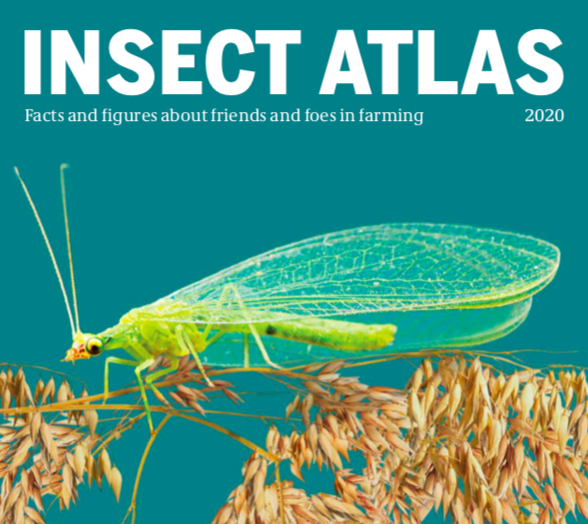Global insect collapse driven by industrial farming, says new Insect Atlas

New report shows nature- friendly agriculture is necessary and possible, but farmers need support for the transition
From Friends of the Earth Europe
Insects are in decline across the world because of industrial farming and heavy pesticide use which are threatening food production, according to the Insect Atlas released today by Heinrich-Böll-Stiftung and Friends of the Earth Europe.
Insects keep the planet’s ecological system running, and ensure our food supply – 75% of our most important crops depend on pollination by insects. Insects also improve soil quality and reduce plant pests by decomposing manure and dead plant matter.
The Insect Atlas shows that insect species and pollinators are in severe decline because of pesticide-dependent industrial farming. It reveals that:
-41% of insect species are in decline, and one-third of all inspect species are threatened with extinction
-Pollinators, which contribute directly to around one-third of global food production, are under threat: at least one in ten bee and butterfly species in Europe is threatened with extinction
-Pesticide use has risen five-fold since 1950, with over 4 million tonnes sprayed on fields worldwide every year. Two-thirds of the pesticides market is dominated by four companies: BASF, Bayer, Syngenta and Corteva
-The explosion in factory farming has led to insect-dense areas of land in Argentina and Brazil being cleared for pesticide-heavy soybean plantations. Worldwide, they now cover 123 million hectares – an area 3.5 times the size of Germany
Mute Schimpf, food and farming campaigner at Friends of the Earth Europe said: “The evidence is clear: pesticide use is wiping out insect populations and ecosystems around the world, and threatening food production. A handful of corporations control the bulk of pesticide supply, and if left unchecked will continue to use their immense political influence to lock in a system of industrial farming which will continue to wipe out nature and destroy rural communities.”
Barbara Unmüßig, President of Heinrich-Böll-Stiftung said: “The global loss of insects is dramatic. Industrial monocultures with energy or fodder plants for our factory farming are driving, in countries such as Brazil or Indonesia, deforestation, monotonous agricultural deserts and the unlimited application of pesticides. In Argentina alone, the use of pesticides has increased tenfold since the 1990s. Pesticides from major chemical companies such as Bayer and BASF, which have long been banned or are no longer licensed in the EU, continue to be traded globally almost without restriction. As a result, nearly 50 percent of the pesticides in Kenya and over 30 percent in Brazil are highly toxic to bees. The Mercosur agreement too negotiated a tariff reduction for chemical products, including pesticides. The goal of exporting even more pesticides to the world’s most biodiverse regions mocks all national sustainability effort.”
The Insect Atlas also shows how the EU can support sustainable models of farming which prevent insect collapse and guarantee food production and good livelihoods for farmers and farmworkers. These include:
-Reducing the use of synthetic pesticides by 80% in agriculture by 2030, with a just transition for farmers – a proposal backed by over 350,000 EU citizens
-Radically reforming the Common Agricultural Policy (CAP) to remove harmful untargeted direct payments, setting aside at least 50% of the CAP budget for environmental, nature and climate objectives and supporting farmers in the transition to agroecology
-Phasing out farming methods which increase pesticide use, such as growing genetically modified plants
-Taking urgent actions to achieve the targets suggested in the European Farm to Fork and Biodiversity strategies to increase organic farming, as well as cutting pesticide and fertilizer use by 2030
-Reducing the production and consumption of factor-farmed meat and other animal products and supporting plant-based options
–
-Cutting the overall EU demand for agrocommodities in order to reduce global deforestation
Barbara Unmüßig continued: “The Biodiversity Strategy and Farm-to-Fork initiative are first steps into a sustainable transition of the European agricultural sector. But ist not sufficient – in order to protect insects we not only need good intentions, but very specific and targeted strategies. The CAP has to be reshaped to finally contribute tangibly and decisively to an insect- and climate-friendly agriculture. Just 20 percent of all producers in Europe get 80% of CAP subsidies – this can not be justified any longer. Large area subsidies from which only a few big farms benefit have to be redirected into supporting small, environmentally and socially viable farming.”
In order to achieve the fundamental shift needed to save insect populations, the European Parliament and Council must drastically increase the ambition of the European Commission’s Farm to Fork and Biodiversity Strategies. [3]
Friends of the Earth Europe and Heinrich-Böll-Stiftung are calling for a new law to cut pesticide use by 80% by 2030, as well as other measures to prepare the way towards fairer and greener food systems.









The author is excellent at writing enough truth’s to disguise the false statements. Pesticide use is increasing the food supply, Not decreasing it.
Tell me……why would a food producer use a product that is going to decrease his output?
Do you know how many more million’s in the world will go hungry (starve to death) without the use of commercial products?
What we need is fair and unbiased writings; without fear mongering.